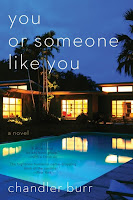 I’d never heard of Chandler Burr or Your or Someone Like You before our sales conference, maybe a year ago, maybe longer. A friend in the office read and adored the book, so I ordered a copy in to read and there it sat on my shelf at work, and then at home, for months and months. So, coming to the “Bs” meant finally reading it, and what a surprise, it’s actually a terrific novel, and completely not what I expected.
I’d never heard of Chandler Burr or Your or Someone Like You before our sales conference, maybe a year ago, maybe longer. A friend in the office read and adored the book, so I ordered a copy in to read and there it sat on my shelf at work, and then at home, for months and months. So, coming to the “Bs” meant finally reading it, and what a surprise, it’s actually a terrific novel, and completely not what I expected.
In a way, Burr’s narrator, Anne, reminded me of a character Lionel Shriver would create: intelligent, uncompromising and, at times, aggressive in terms of what she wants out of life. At it’s heart, this is a book about words, what they mean, how we use them, and how books enrich a life. Anne’s got a PhD in English Literature. She’s been married to Howard Rosebaum for years. He’s a huge Hollywood producer and they’ve been living in LA for years. They are the elite of the elite of LA, they know everyone, and everyone knows them.
Anne’s background, British by accent, raised around the world by her parents as her father served in the Foreign Legion, has taught her that home is always where you choose to be; Howard, her husband, feels like home is where you go back to, where people always have to accept you. This fundamental different might not seem like much, but when religion becomes involved (Anne never converted; Howard is Jewish but not Orthodox or necessarily practicing), it becomes a fissure that threatens to tear the couple apart. And when their son Sam announces that he’s going to visit Israel, to explore his roots, something happens to shake Howard and Anne’s marriage to the core.
Surrounding the family drama, Anne begins a book club — more like an intense canonical reading group — and she takes directors, screenwriters, producers, line producers, and the like through the books as a means of self-improvement and understanding. From there, it gets out of control, an article in Vanity Fair, and then all of sudden she’s about to produce her own movie. Not always likable and not always saying things that prove popular, when Howard has a crisis of conscious, Anne breaks all boundaries to get him back. In a way, she has chosen love and family above all else, and without Howard, she’s not home, she’s not where she wants to be. But how she gets there, and her opinions, and what she has to say to impact him, to pull him back from where he ended up, well, it’s neither politically correct nor all together sane.
The book is delicious in its irony, and carries the weight of its words very well. It’s hard to write a book about high literature, about some of the greatest books ever written, include many of their words, and not expect the book to hold up to the same kind of scrutiny. I didn’t agree with a lot of what Anne said sometimes, especially towards the end, but that’s the point — she was trying to be argumentative, fighting with all of her words to get her husband back, and regardless of the outcome (SPOILER: she gives a disastrous speech in front of a lot of truly “important” people), you can’t fault her reason or her passion. But I think the most successful aspect of the novel is the fact that it truly doesn’t go where you expect a simple story about a marriage either falling apart or coming back together goes. In fact, there’s nothing simple about this book, and that’s to be celebrated.
CHALLENGES: Off the shelf…